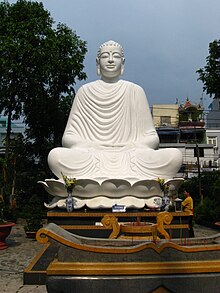Ānantarya karma (Sanskrit) or Ānantarika kamma (Pāli)[1] are the most serious offences in Buddhism that, at death, through the overwhelming karmic strength of any single one of them, bring immediate disaster.[2][3] Both Buddhists and non-Buddhists must avoid them at all costs. Such offenses prevent perpetrators from attaining any of the stages of enlightenment[4] and from ordaining into the Sangha. The offences are:[5][6][7]
- Killing one's mother
- Killing one's father
- Killing an Arahant
- Wounding a Tathagata
- Creating schism in the Sangha[8]

Ānantarika kamma is so serious that even Amitabha Buddha abandoned all hope. His Vow 18 reads:[9]
"If I attain Buddhahood and a sentient being aspires with faith and joy to be reborn in my Sukhavati Pure Land: if they recite my name just ten times and, in spite of this, are not reborn there, then may I myself not attain enlightenment [in the first place]. Two exceptions to this solemn promise are in respect of, firstly, those who have committed the five terrible offences and, secondly, of those who have vilified the Sublime Dharma [because such people cannot be reborn in Sukhavati]."
See also
editReferences
edit- ^ "SuttaCentral". SuttaCentral. Retrieved 2022-10-02.
- ^ Gananath Obeyesekere (1990), The Work of Culture: Symbolic Transformation in Psychoanalysis and Anthropology, University of Chicago, ISBN 978-0-226-61599-8
- ^ Walters, Jonathan S. (1990). "The Buddha's Bad Karma: A Problem in the History of Theravâda Buddhism". Numen. 37 (1): 70–95. doi:10.2307/3269825. JSTOR 3269825.
- ^ Nakamura, Hajime (1991). Ways of Thinking of Eastern Peoples: India, China, Tibet, Japan. Motilal Banarsidass. p. 285. ISBN 978-8120807648.
- ^ "The Sutra Preached by the Buddha on the Total Extinction of the Dharma". buddhism.org. Retrieved 10 January 2013.
- ^ Nyanatiloka (1980), Buddhist Dictionary: Manual of Buddhist Terms and Doctrines, Buddhist Publication Society, ISBN 978-955-24-0019-3
- ^ Triplegem glossary Archived 2006-12-28 at the Wayback Machine
- ^ Creating a division in the Sangha / dividing the Sangha in terms of Buddhist beliefs
- ^ "The Amitabha Sutra as discoursed by the Buddha" (PDF). Fo Guang Shan International Translation Center. 2017. Archived from the original (PDF) on 22 October 2022.
Further reading
edit- Silk, Jonathan A. (2007). Good and Evil in Indian Buddhism: The Five Sins of Immediate Retribution, Journal of Indian Philosophy 35 (3), 253–286